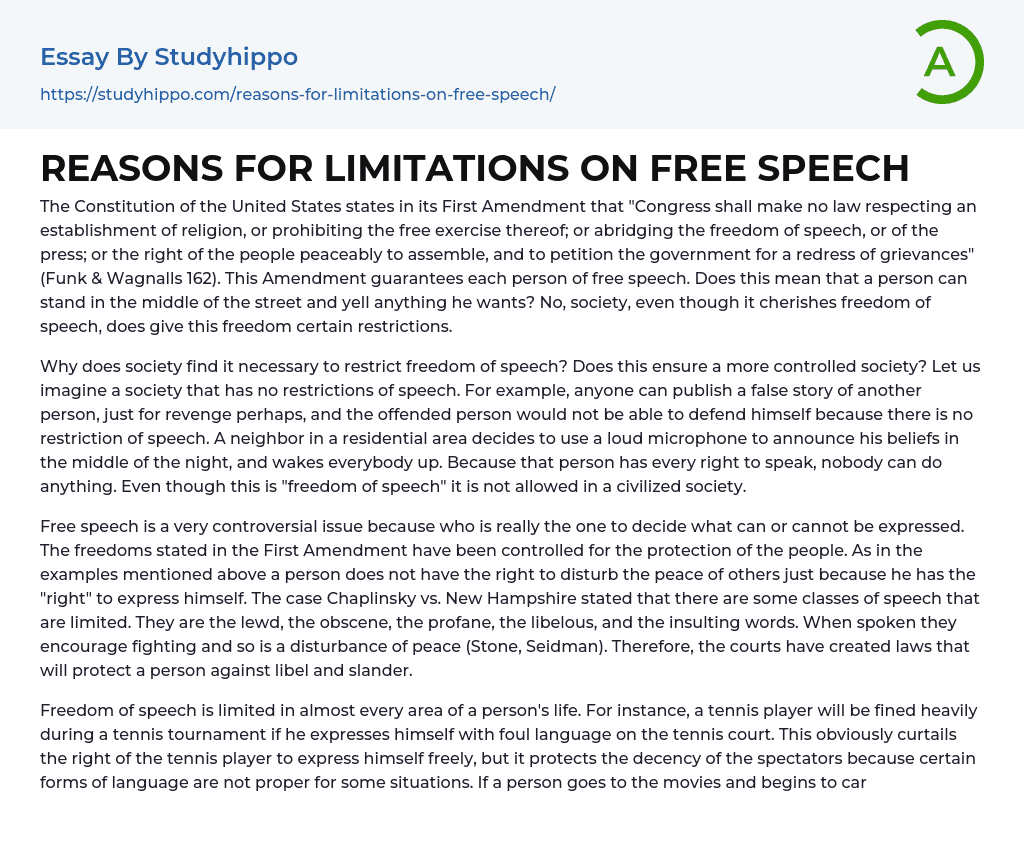The First Amendment of the United States Constitution prohibits Congress from passing laws that establish a religion or interfere with religious practices, restrict freedom of speech and the press, or prevent peaceful assembly and petitioning of the government for grievances (Funk & Wagnalls 162). This amendment guarantees every person's right to freely express themselves. However, society places certain limitations on this freedom in order to maintain control and prevent harm. Without restrictions on speech, individuals could spread false stories out of revenge without repercussions, leaving targets defenseless. In residential areas, someone might disturb everyone's sleep by using a loud microphone to broadcast their beliefs at night. While technically considered "freedom of speech," such actions are not acceptable in a civilized society. Determining what can be expressed becomes problematic as there is no clear authority. Ther
...efore, regulations have been established to protect people's well-being while upholding the freedoms outlined in the First Amendment. As demonstrated in previous examples, individuals cannot disrupt others' peace solely based on their right to express themselves. The case Chaplinsky vs...The New Hampshire case established that certain types of speech, such as lewd, obscene, profane, libelous, and insulting words, are restricted. Uttering these words can incite violence and disrupt the peace (Stone, Seidman). As a result, laws have been enacted to protect individuals from libel and slander. Freedom of speech is limited in various aspects of life. For example, in a tennis tournament, players can face significant fines if they use offensive language on the court. While this limits their freedom of expression, it also ensures appropriate behavior for spectators in specific settings. If someone speaks loudly in a movie theater, security
will likely ask them to leave. By restricting their freedom of speech in this situation, the theater protects the rights of those who came to enjoy the film. American courts have ruled that falsely shouting "fire" in a theater is not protected by freedom of speech because it creates immediate and clear danger (Stone, Seidman). Thus, freedom of speech cannot be abused. There are times when it becomes necessary for the government to prioritize citizen safety—especially during wartime. One historical instance was when Congress implemented the Alien and Sedition Acts in 1798; this made inciting rebellion against the established government a criminal offense (Microsoft "Speech,Freedomof").This text highlights the limitations on freedom of speech and the role of censorship in movies, music, and books. Some states have even removed specific books from libraries, like Mark Twain's Tom Sawyer due to offensive language towards the black community. This raises controversy about the boundaries of freedom of speech. Governments should exercise caution when limiting this right as oppressive regimes like communism demonstrate how society suffers when free expression is restricted. For example, Cuba prohibits negative comments about the government, giving them complete control over their people. However, individuals will always value their freedom of speech in a true society.
While freedom of speech is valuable in a democratic society, it is important to establish certain boundaries. It is unreasonable for someone to use offensive language publicly without consequences. Misusing this right to attack others without evidence goes against its purpose. Freedom of speech should not be used to incite fights or rebellions. The government has implemented measures to prevent such abuses of this right.The text below discusses the topic
of freedom of speech and includes references to various sources such as Funk & Wagnalls New Encyclopedia, Microsoft Encarta 98 Encyclopedia, and Constitutional Law by Geoffrey R. Stone and Robert H. Seidman.
(WORKS CITED: Funk & Wagnalls New Encyclopedia, Volume 7, R.R. Donnelley & Sons Company. "Speech, Freedom of," Microsoft(R) Encarta(R) 98 Encyclopedia. (c) Microsoft Corporation 1993-1997. Stone, Geoffrey R.; Seidman, Robert H. Constitutional Law, 2nd Boston: Little Brown & Company, 1991.)
- Jurisprudence essays
- Social Injustice essays
- Juvenile Justice essays
- Bill Of Rights essays
- Civil Liberties essays
- First Amendment To The United States Constitution essays
- Fourth Amendment To The United States Constitution essays
- Second amendment essays
- Free Speech essays
- Freedom Of Speech essays
- Gettysburg Address essays
- Informative Speech essays
- Persuasive Speech essays
- Public Speaking essays
- Agreement essays
- Business Law essays
- Common Law essays
- Community Policing essays
- Constitution essays
- Consumer Protection essays
- Contract essays
- Contract Law essays
- Copyright Infringement essays
- Court essays
- Crime essays
- Criminal Law essays
- Employment Law essays
- Family Law essays
- Injustice essays
- Judge essays
- Jury essays
- Justice essays
- Lawsuit essays
- Lawyer essays
- Marijuana Legalization essays
- Ownership essays
- Police essays
- Property essays
- Protection essays
- Security essays
- Tort Law essays
- Treaty essays
- United States Constitution essays
- War on Drugs essays
- Adaptation essays
- Adventure essays
- Adversity essays
- Aging essays
- Alcohol essays
- Barbie Doll essays




